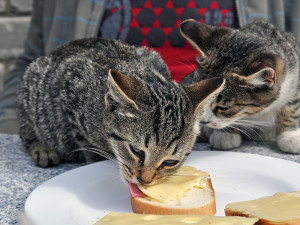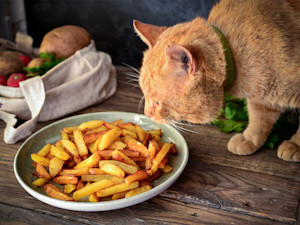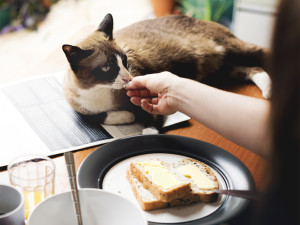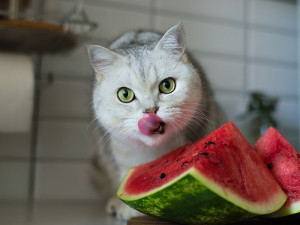Can Cats Eat Hot Dogs?
Find out of if your kitty can come to the barbecue this summer.

share article
Although cats are true carnivores, reliant upon meat to satisfy their nutritional needs, not all meat is healthy for them to eat, and hot dogs are a good example of that. Hot dogs are a processed meat that contain a number of different ingredients, some of which are unhealthy for kitties, while others can be downright toxic.
And while you may want to share a bit of your summertime barbecue with your cat, it is important to know what foods are safe to share and which ones to avoid. Read on to learn more about how your cat can get the most out of grill season.
Nutrition facts about hot dogs for cats
Hot dogs are a form of sausage that are usually sold pre-cooked. They can be made from many different meats and some plant-based varieties are also widely available now. Traditionally, hot dogs are made from pork or beef trimmings that are then combined with different spices and preservatives.
These ingredients are mixed into a thick emulsion that is mechanically squeezed into casings to give them their sausage-like shape. Hot dogs are usually cooked and/or smoked at this stage, and sometimes the casings are removed prior to packaging. The nutritional value will vary based on the exact ingredients found in different hot dogs, but most are high in protein, fat, and salt.
While these nutrients are all vital to cats’ diets in the right proportions, hot dogs tend to contain an unhealthy balance of these nutrients as well as other ingredients that may be unhealthy and/or toxic for cats.
Are hot dogs good for cats?
Hot dogs are not good for cats. There are a lot of ingredients typically found in hot dogs that are not healthy for kitties. And while some nutrients found in hot dogs are important for cats, there are healthier sources for these nutrients. This includes:
Fat: Hot dogs are typically high in fat. Fat is an important source of energy for cats, and is necessary for healthy skin and coat quality. Cats tend to be more tolerant of high fat foods than dogs. Additionally, they do not typically suffer from the same kinds of heart diseases that people get, making their fat intake less of a concern, as long as they are otherwise healthy.
Protein: As obligate carnivores, cats have a high demand for animal-based protein.opens in a new tab Protein is a great source of energy for them and also provides the critical amino acids used for vital processes throughout the body. All commercial cat foods are required to meet cats’ daily protein needs, so any additional protein they get from snacks or treats is an added bonus.
Can cats eat any kind of hot dog?
There are so many different kinds of hot dogs available and each has its own unique blend of flavors and spices. It is very important to check the ingredients thoroughly before sharing any food with your cat as some foods that are just fine for us are not necessarily safe for them.
For example, many hot dogs contain seasoning like garlic powderopens in a new tab and/or onion powder, both of which are toxic for cats if they consume enough. Others may contain more unusual spices or unexpected ingredients so don’t assume it is safe for them until you have checked the packaging.
Are hot dogs completely safe for cats?
Hot dogs are not completely safe for cats; many brands contain ingredients that are unhealthy and may even be toxic. If you want your kitty to be able to partake in the family barbecue, stick to sharing pieces of plain, lean, white meats like chicken or turkey that have had skin, bones and seasoning removed. Some reasons to skip sharing your hot dog include:
High fat content: Although cats can tolerate higher levels of fat in their diet than dogs, a very high fat snack can still cause digestive upset including vomiting and/or diarrhea. If they eat high fat snacks on the regular, this adds additional calories to their diet which can lead to weight gain and related health problems like diabetesopens in a new tab and/or arthritisopens in a new tab.
Lots of sodium: Cats should not eat foods with large amounts of sodium chloride, or salt. A bite or two of something salty will make them extra thirsty and may also make them pee more. However, if they frequently eat foods that are high in sodium, or eat a lot of salt in one sitting, this can lead to more serious health problems. High levels of sodium in the blood can lead to increased blood pressure and strain on the heart, vomitingopens in a new tab, diarrhea — and in severe cases — swelling of the brain.
Preservatives: Most hot dogs contain some kinds of preservatives to extend their shelf life. Even uncured hot dogs use naturally-sourced preservatives, like celery extracts as a source of nitrates. Nitrates, which are often found in cured meats, are considered a carcinogen and may be associated with an increased risk of certain cancersopens in a new tab when consumed frequently. It’s best to avoid feeding them to your cat as a regular snack or treat.
Other ingredients: Hot dogs frequently contain garlic and onion powder, which are both toxic to cats. Different brands may also contain other potential toxinsopens in a new tab, and it is nearly impossible to determine how much of each ingredient is in a given hot dog and how much would make your cat sick.
Choking and other barbecue dangers: In the celebratory chaos of a good barbecue, it can be difficult to keep an eye on your cat, giving them ample opportunities to steal food, sneak out the door, or find other sources of mischief. Be sure to keep hot food far out of reach to avoid burns and keep the trash sealed up tight.
Large pieces of hot dog and other grilled meats can also pose a choking hazard for cats, especially if they contain bones or tough skin. Confiscate any non-edible materials that have the scent or taste of meat on them like skewers and/or plastic wrapping. These can cause injuries including intestinal blockagesopens in a new tab, if swallowed.
And don’t forget to check the toppings; a hot dog with ketchup, mustard, relish, or any other condiments may contain additional ingredients that are unsafe for them, so be sure to consider those as well.
The bottom line: Can cats eat human food?
Yes, cats can eat many kinds of human foods, and you may be surprised at which ones they enjoy. The most important take-away message is to choose wiselyopens in a new tab; while many human foods can be fine for cats to try, others can be unhealthy or even toxic. Because they are carnivores, their dietary needs are also quite different from ours. They need to eat a complete and balanced diet that is tailored specifically to their needs.
This will prevent nutritional deficiencies that can lead to serious health problems. Therefore, treats and table foods need to be kept to a minimumopens in a new tab, so that they get most of their calories from a balanced diet. Limiting treats will also prevent you from unintentionally overfeeding your cat, which can lead to obesity and related health problems.
Indoor cats tend to be less active, and as a result, are more at risk for weight gainopens in a new tab over time. There are many creative ways to encourage your cat to be more active too. Saving special treats or table snacks for activities, like food puzzlesopens in a new tab, games, and training sessions can be a great motivator to keep them moving.
Other foods that are safe for cats
Shrimp can beopens in a new tab a tasty high protein snack.
Carrots can beopens in a new tab a crunchy treat in moderation.
Apples are also safeopens in a new tab in small amounts.
Other foods that are dangerous
Chocolate is always a noopens in a new tab, no because it is toxic to cats.
Grapes and raisins opens in a new tabare also toxic and should be kept out of reach.
FAQs (People Also Ask)
How much hot dog can a cat eat?
This depends on the specific ingredients, but in most cases, hot dogs should be avoided altogether or just used for the occasional bite-sized treat and no more.
Is it OK to give cats hot dogs?
Hot dogs are not healthy for cats and some contain ingredients that may be toxic.
Why do cats like hot dogs?
Cats are attracted to foods that are high in fat and protein and hot dogs contain both.
Can cats eat vegetarian hot dogs?
This depends on the ingredients but many brands contain ingredients that are not safe for cats like garlic and onions.
References
Harvard Health Publishing: Nitrates in Food and Medicine: What's the Story?opens in a new tab
Merck Veterinary Manual: Salt Toxicosis in Animalsopens in a new tab
National Hot Dog and Sausage Council: How Hot Dogs are Made: The Real Storyopens in a new tab
Scientific American: What’s in your Wiener? Hot Dog Ingredients Explainedopens in a new tab
Tufts Clinical Nutrition Service: What Nutrients are Essential for My Pet?opens in a new tab

Dr. Amy Fox, DVM
Amy Fox, DVM is a small animal veterinarian in New York City. A lifelong animal lover, Dr. Fox studied biology in college and then worked as a veterinary nurse before pursuing veterinary school at Cornell University. She has worked in many different settings including shelter medicine, emergency medicine, general practice, and animal cruelty and forensics. She is especially interested in nutrition, preventative medicine and care for senior pets. Dr. Fox also enjoys writing about veterinary medicine and teaching. In her free time she loves to cook, garden, and go for long runs.
Related articles
- opens in a new tab
Can Cats Eat Peanuts?
They’re not technically dangerous, but they’re not ideal.
![Cat sniffing French fries on dinner table.]() opens in a new tab
opens in a new tabCan Cats Eat Potatoes?
They just want a little bite...
- opens in a new tab
Can Cats Eat Sweet Potatoes?
Yep—but the plainer, the better. Here’s why.
![Woman feeding her cat buttered toast for breakfast.]() opens in a new tab
opens in a new tabCan Cats Eat Butter?
Butter isn’t toxic to your cat—but despite what they tell you, they really shouldn’t eat it.
![a woman eats breakfast with pomegranate while her cat sits on her lap]() opens in a new tab
opens in a new tabCan Cats Eat Pomegranates?
Vets want them to steer clear. Here’s why.
![White kitten with tongue out next to slices of watermelon]() opens in a new tab
opens in a new tabCan My Cat Safely Enjoy Watermelon? A Guide to Feline Dietary Choices
Yes, the summertime staple is on the list of “safe” foods for cats.







